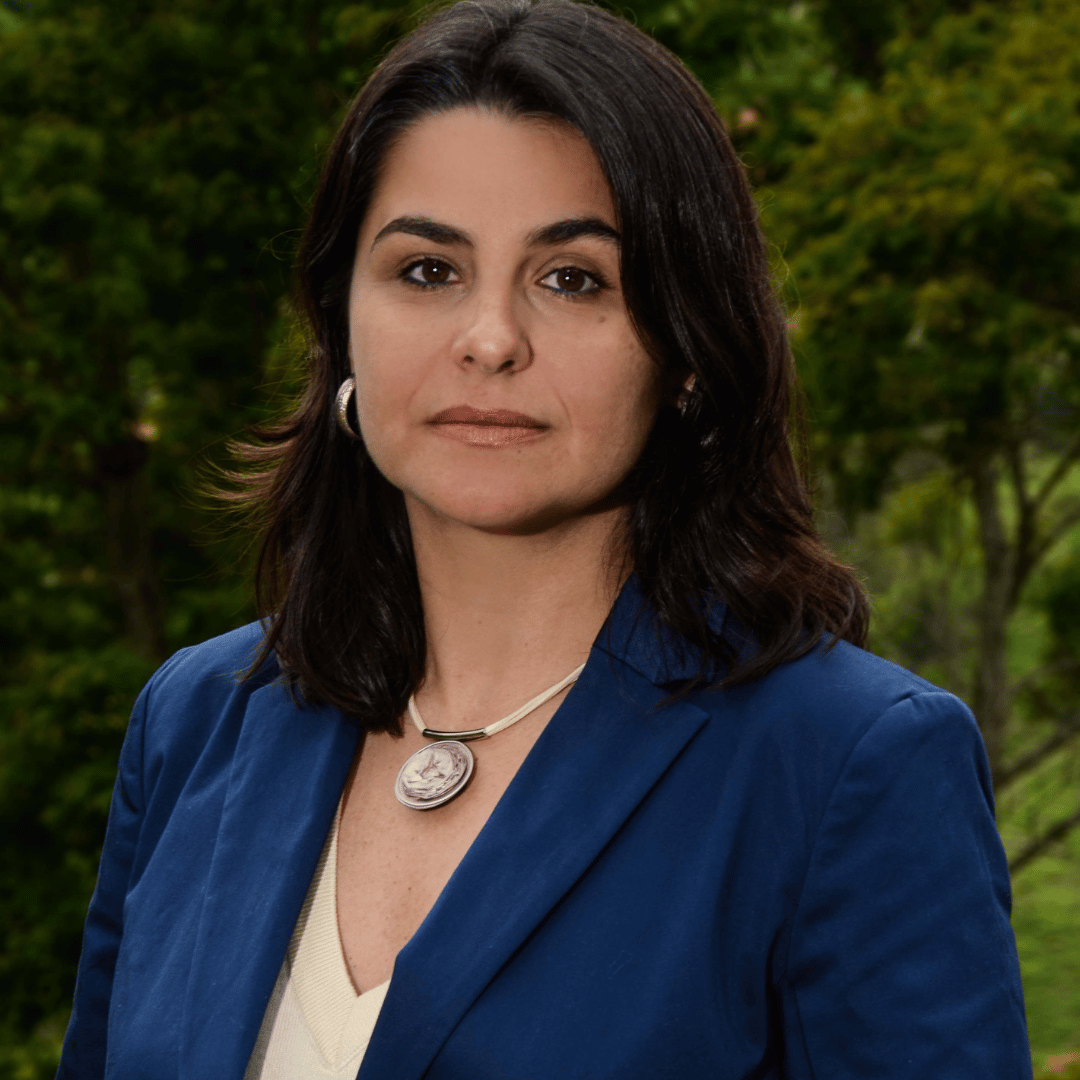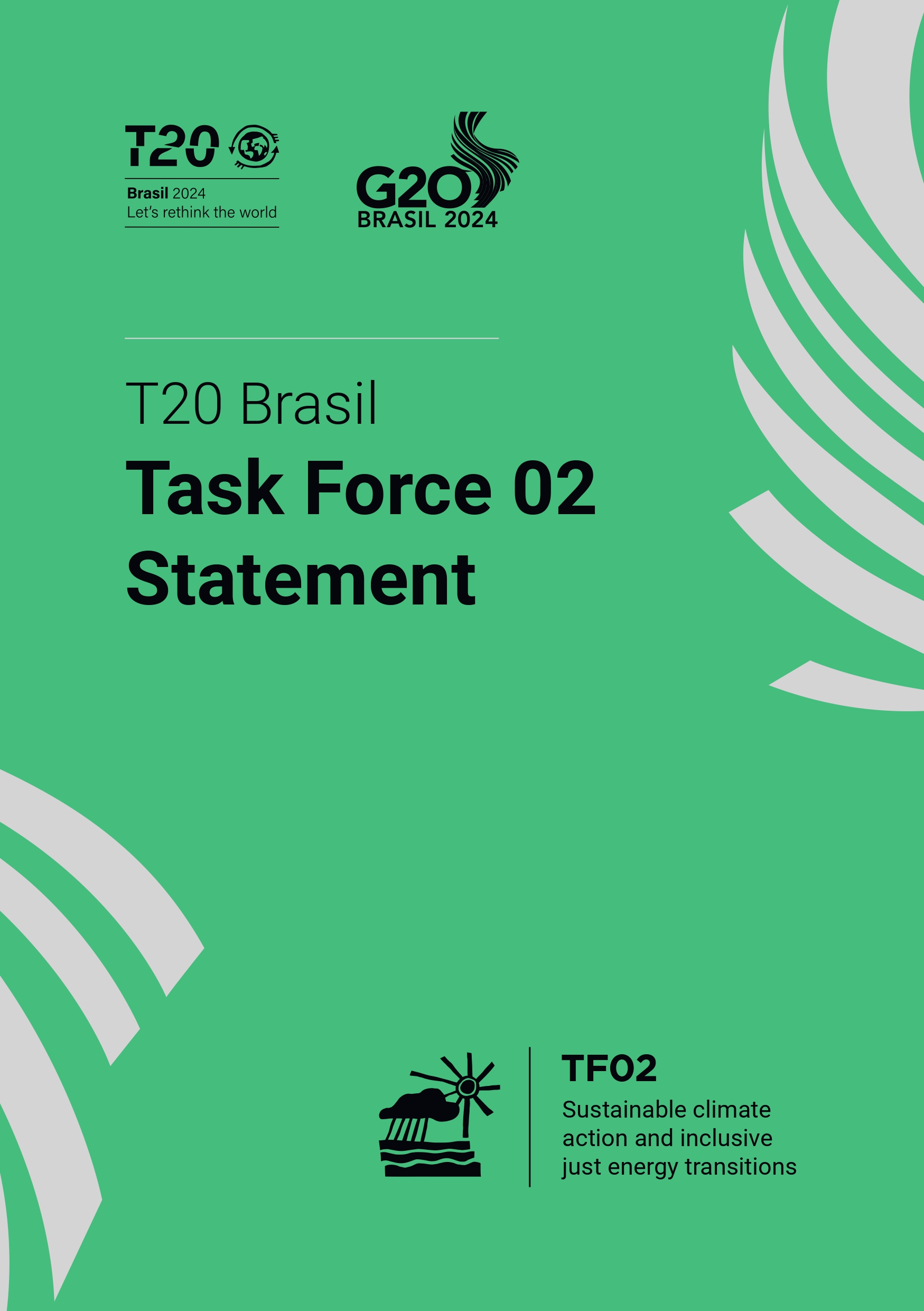
TF02
Sustainable climate action and inclusive just energy transitions
TF02 is dedicated to addressing critical facets of climate action, especially emphasizing issues related to energy transitions, with a central focus on inclusivity and justice. The recommendations from this task force are aimed at supporting the work and deliberations of the special Task Force for Global Mobilization against Climate Change established by Brazil’s G20 presidency. In addition, TF02 seeks to inform the work and thematic priorities of the Sustainable Finance Working Group and the Infrastructure Working Group of the G20 Finance Track, as well as the Sherpa Track's working groups on Energy Transition, on the Environment, Climate and Sustainability Working Group, on Disaster Risk Reduction, on Agriculture, and on Employment.
This TF tackles several critical issues through these subtopics, contributing to accelerate progress towards multiple SDGs:
2.1. Fostering sustainable, inclusive, and just energy transitions: Highlighting the importance of equitable energy transitions, this task force aims to develop policy proposals to ensure that the necessary shift towards sustainable energy is inclusive and fair for all (countries, people, and the planet). This includes promoting a justice-oriented approach to guarantee access to sustainable energy, while providing support for workers in sectors most affected by transition patterns, as well as implementing policies aimed at mitigating the adverse environmental, social, and economic impacts associated with the extraction of critical minerals (and the production of biofuels) that are required for various energy transition models (SDGs 7, 8, 9, 10, 12, and 13).
- Rosana Santos, E+ Energy Transition Institute (Brazil)
- Milena Megre, E+ Energy Transition Institute (Brazil)
- Clauber Leite, E+ Energy Transition Institute (Brazil)
- Matias Bianchi, Asuntos del Sur (Argentina)
- Ignacio Lara, Asuntos del Sur (Argentina)
- Rachel Meidl, Center for Energy Studies, Rice University (United States)
2.2. Accelerating transition to a low-carbon economy and sustainable consumption/production: Prioritizing the shift towards a low-carbon economy, the TF will propose context-specific policies aimed at fostering sustainable production and consumption patterns. The overarching goal of these policies is to help reduce the environmental impact of productive sectors while fostering inclusive economic growth and sustainable neo-industrialisation, especially in emerging economies and least developed countries (SDGs 1, 2, 7, 8, 9, 10, 13, 14, 15, and 17).
- Shuva Raha, CEEW - Council on Energy, Environment and Water (India)
- Fabian Barrera, Agora Industry (Germany)
- Aylin Shawkat, Agora Industry (Germany)
- Zaffar Hussain, Agora Industry (Germany)
- Barbara Bressan, CGEE - Center for Strategic Studies and Management in Science, Technology and Innovation (Brazil)
- Emilly Caroline, CGEE - Center for Strategic Studies and Management in Science, Technology and Innovation (Brazil)
2.3. Fostering investment and open innovation for sociobioeconomy and nature-based solutions: On this subtopic, the TF will focus on encouraging investment and innovation in sociobioeconomy and nature-based solutions to tackle climate challenges, with a particular emphasis on the pivotal role of open innovation and technology transfers in sustainable development (SDGs 1, 2, 8, 10, 12, 13, 14, 15, and 17).
- Monique Atouguia, NatureFinance (South Africa)
- Fiona Napier, NatureFinance (Kenya)
- Carolina Sousa, NatureFinance (Brazil)
- Alexander Ryota Keeley, Urban Institute, Kyushu University (Japan)
- Shunsuke Managi, Urban Institute, Kyushu University (Japan)
- Igor Makarov, HSE - Higher School of Economics (Russia)
2.4. Investing in sustainable, inclusive, and resilient infrastructure: Recognizing the pivotal role of infrastructure in sustainable development, the TF will look into investments that promote inclusivity, resilience, and sustainability. A particular focus will be placed on fostering climate resilient cities (SDGs 1, 2, 7, 9, 11, and 17).
- Juliana Luiz, Instituto Escolhas (Brazil)
- Anita Prakash, ERIA - Economic Research Institute for ASEAN and East Asia (Regional)
- Saehee Jeong, SFOC - Solutions for our Climate (South Korea)
2.5. Optimising access to multilateral and climate funds and leveraging private capital for climate finance: The TF aims to explore avenues to enhance climate finance by suggesting measures that can improve access to multilateral funds and leverage private capital through blended finance models, with a particular focus on broadening opportunities for developing nations (SDGs 13, and 17).
- Frank Schroeder, E3G - Third Generation Environmentalism (United Kingdom)
- Marina Caetano, Instituto Talanoa (Brazil)
- Fatih Yilmaz, KAPSARC - King Abdullah Petroleum Studies and Research Centre (Saudi Arabia)
2.6. Operationalizing climate justice through financing and technology transfer: The TF aims to propose ways to operationalise the concept of climate justice by ensuring equitable access to financing and technology transfer. This approach seeks to empower all nations to effectively combat climate change while addressing inequalities among countries and within countries, including horizontal inequalities, such as environmental racism (SDGs 9, 10, 13, 15, and 17).
- Alex Benkenstein, SAIIA - South Africa Institute of International Affairs (South Africa)
- Diego Azzi, UFABC - Federal University of ABC (Brazil)
- Giorgio Romano, UFABC - Federal University of ABC (Brazil)
- Nicolas Buchoud, ADBI - Asian Development Bank Institute (Regional)
2.7. Implementing just sustainability reporting requirements: the role of ESG metrics: The TF will seek to contribute to greater transparency, accountability, and standardization of companies' Environmental, Social, and Governance (ESG) metrics and taxonomies. This effort aims to enable companies to more effectively contribute toward creating more just and sustainable trade and investment flows worldwide.
- Huma Saif Qazi, CDP (Global)
- Raíssa Saré, CDP (Global)
- Guven Sak, TEPAV - The Economic Policy Research Foundation of Turkey (Türkiye)
- Ambassador Bozkurt Aran, TEPAV - The Economic Policy Research Foundation of Turkey (Türkiye)
- Joisa Dutra, Center for Regulatory and Infrastructure Studies, FGV - Getulio Vargas Foundation (Brazil)
- Diogo Lisbona Romeiro, Center for Regulatory and Infrastructure Studies, FGV - Getulio Vargas Foundation (Brazil)
By addressing these critical sub-topics, the T20 Brasil TF02 endeavors to develop comprehensive strategies to promote sustainable climate action, drive inclusive energy transitions, and pave the way for a more equitable and resilient future for all.
Click here to access TF02's LinkedIn community: https://www.linkedin.com/groups/12954102/
LEAD CO-CHAIRS

Maiara Folly
Executive Director and Co-founder, Plataforma Cipó

Céline Kauffmann
Director of Programs, Institute for Sustainable Development and International Relations (IDDRI)
DEPUTY LEAD CO-CHAIR

Mariana Rondon
Programme Director, Plataforma Cipó

Damien Barchiche
Director of the Sustainable Development Governance Program, Institute for Sustainable Development and International Relations (IDDRI)

Vitória Gonzalez
Associate Researcher, Plataforma Cipó
TASK FORCE STATEMENT
